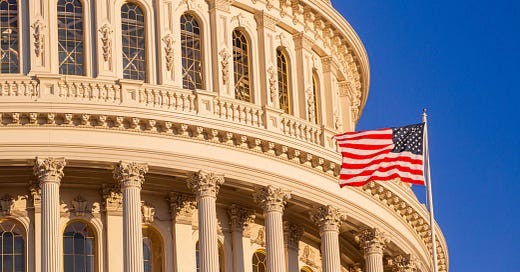We still need justice for January 6th
There is no "too late" here: investigate, prosecute, expel, imprison.
On this day of remembrance, I’m struggling to organize my thoughts in ways that feel either coherent or helpful.
Amidst my discomforting and imperfect memory of a year ago, I am reminded of the important truth of the fragility of American democracy. I appreciate President Biden’s elevation of this conversation especially today. But he (and we) must acknowledge that we are not at risk of normalizing political violence and of weakening our democratic institutions as he suggested. Until there is meaningful accountability (up to and including expelling members of Congress who encouraged before hand, participated in during, and continue to perpetuate lies and ongoing attacks on democracy exemplified by, but not limited to, the armed assault on the Capitol), we are a country that has normalized political violence and has fragile democratic institutions.
Even considering the deaths of 5 people, perhaps the most damaging ongoing effect of the deadly, violent attack on the Capitol is that we now consider that — an armed, violent assault — to be what an attack on democracy looks like.
Truth: our democracy is under legal, rhetorical, and philosophical attack everyday.
People in power are actively lying about our elections — both past and future — while they and others actively weaken and make more partisan our already fragile democratic infrastructure. The constant stream minimization, trivialization, outright denial, and disinformation about basic events much less their interpretation and meaning. The ongoing conflation of patriotism and partisanship. Last January 6th as a moment was not a single test. We are failing the test day in and day out as we let too much of this erosion go unanswered and fail to hold its perpetrators to account. Our work now is not about protecting our democracy. The opportunity in front of us is to build a new one, a principled, just, equitable one capable of living up to the greatest ambitions that we have held since our founding and always fallen short of. To take what has been a glorious and imperfect foundation of our last centuries and create a future for our democracy that is more durable, more worthy of all of us, more inclusive of all of us, and more genuinely representative of all of us.
If we are inspired to begin, what this work requires is what was required a year ago, even before the violent assault on the Capitol: consequences for undermining our democratic institutions and processes during and after the election before the assault, the assault itself, and every lie of the last year that continues to erode, bit by bit, our faith in democracy. With every false assertion, every cynical trivializing of what is most sacred about liberty and democratic tradition is how, inch by inch, we lose contact with the moral foundations that underlie our democratic institutions. And that loss of contact with morality is what undermines our attachment to community, our trust in society, and accelerates our tacit acceptance of democratic collapse as inevitable. Untethered from each other, democracy begins to feel naive at best and outright undesirable at worst. A year ago even before the violence, we needed justice not retribution: we are still waiting for it, still craving it, and it is not too late.




